![[New] 2024 Approved DIY Remote Podcast Production Tips](https://thmb.techidaily.com/5f19d12263b1224bd46b49560f2a184a0c0f8c0d56bb43f9e5c26e9a6768a6cd.jpg)
"[New] 2024 Approved DIY Remote Podcast Production Tips"

DIY Remote Podcast Production Tips
Remote Podcasts allow you to connect with people who would be challenging to interview in person. Additionally, remote podcasts make it simpler to record a podcast video and have several guests on your podcast at once.
Whether you run an interview show or have a co-host who works online, you should know how to record a podcast remotely. Let’s start with four options to conduct your remote podcast best.
- What Recording App Is the Best Fit for Your Podcast?
- Hot FAQs About How to Record a Podcast Remotely
Part 1. How to Podcast Remotely
With the advanced tech, recording podcasts remotely is no longer a problem. We’ve provided some common methods you can use.
1. Using video conferencing software
If you are a beginner at podcasting, using video conferencing software is the best option, as it is both efficient and budget-friendly. Zoom, Google Meet, and Microsoft Teams are famous video conferencing software.
2. Use a mixer to record phone calls
This method is most suitable for podcasters and visitors who need a reliable internet connection. It is simple and free to use. All you need is a good mobile signal, a podcast microphone, headphones, an iPhone or Android phone, a 1/4” cable, and an XLR microphone.
Even if your visitor doesn’t have Wi-Fi or isn’t technologically aware, you can call them and record the conversation. However, it should be the last op
3. Record a double-ender
This last method is best for getting excellent sound quality on a budget. It is challenging to use but offers free services and studio quality. It would be best if you had a Podcast microphone, headphones, recording software, and computer to use this method. This equipment is required for both participants.
You get the most excellent audio quality possible because these files are local recordings. However, they are challenging to set up and ineffective for video recordings. Therefore, we’ve listed top-rated audio recording apps and software for you.
Part 2. Best Audio Recording Apps and Software to Record Remotely
Following are the details of some of the best platforms used to Record Podcast Remotely.
1. Alitu
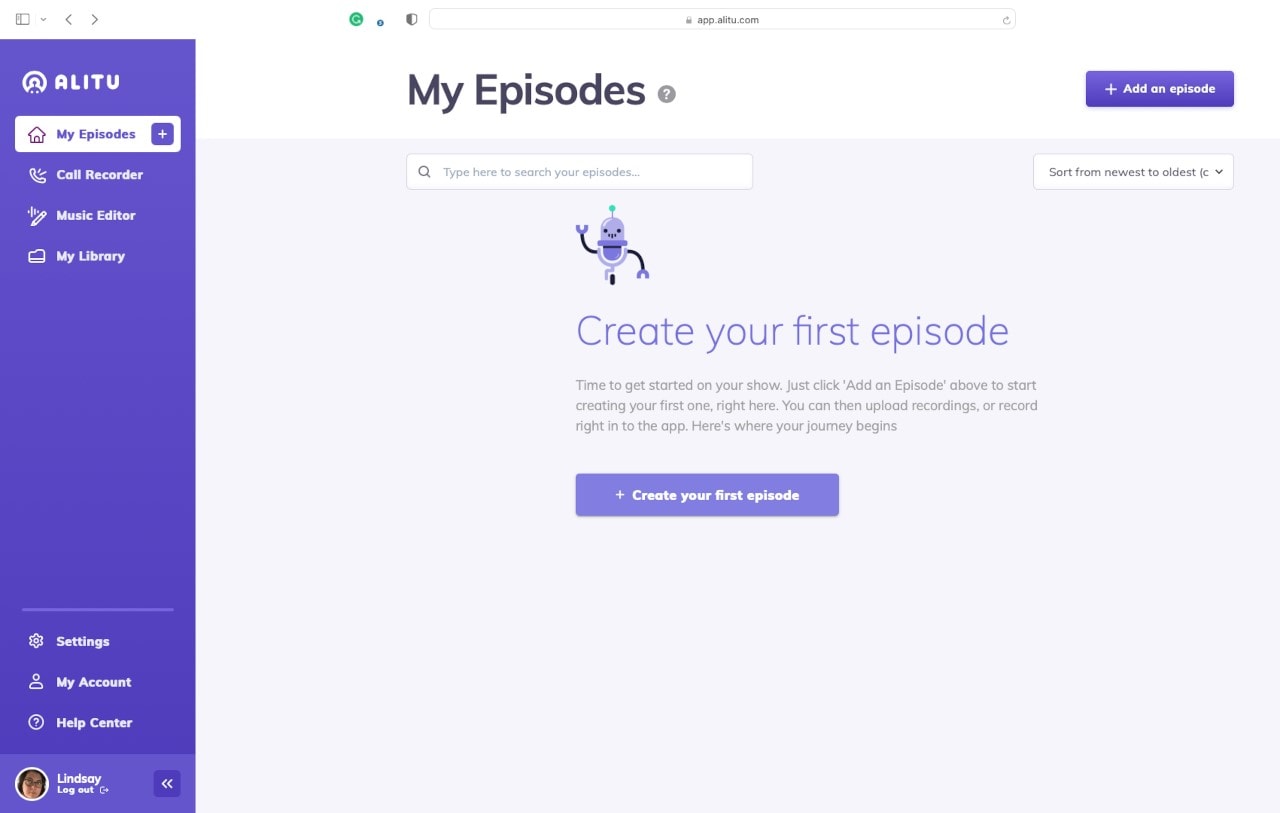
Alitu is an all-in-one podcast creator for people who desire high-quality podcasts. This software allows you to record group calls and leaves the rest of the technical details. In addition, it uses simple “drag and drops” editing technology, making work more efficient.
Once complete, you may modify the recording in the Alitu episode builder. You can also add intros, outros, commercials, or transitional effects. After that, you can publish your podcast episode to your selected hosting service or Alito’s built-in hosting.
Alitu’s features are available for one flat rate and can be accessed through its easy-to-use, intuitive interface.
Features:
- Audio files (MP3) can be uploaded directly to your host or Alitu’s internal server.
- Video recording: No, but it can make a video of your episode by putting together a still image and a moving soundwave.
- Web App: Yes
- Split-track: No
- Transcription: Yes
- Podcast hosting: Yes
- Noise reduction: Yes
- Voice leveling: Yes
- Post-production AI: Yes
2. SquadCast
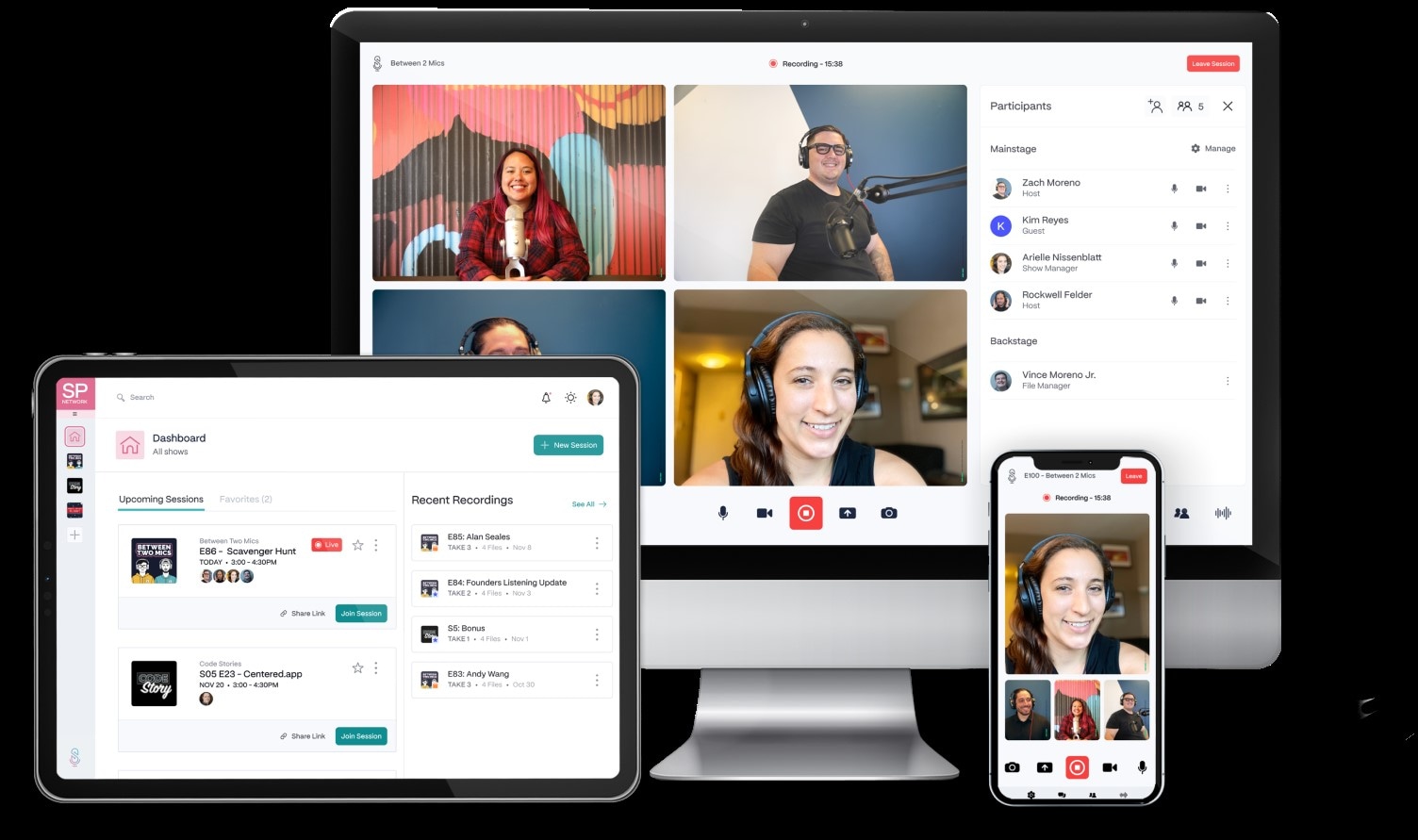
It provides a wide range of features that will aid any podcaster in improving their recording. In addition, SoundCast guarantees the protection and safety of your work.
Additionally, you can participate by video with a single host and as many as three guests. A guest can join a recording without creating an account. SquadCast’s user-friendly interface is easy for anyone. It will be easy even if they are unfamiliar with remote recording software.
Features:
- Sound and video files in MP3, MP4, and WAV formats
- Web App: Yes
- Guest requirements: No
- Split-track: Yes
- Transcription: No
- Editing: No
- Progressive upload: Yes
- Post-production recording separation: Yes
- Automatic backups: Yes
3. Spreaker
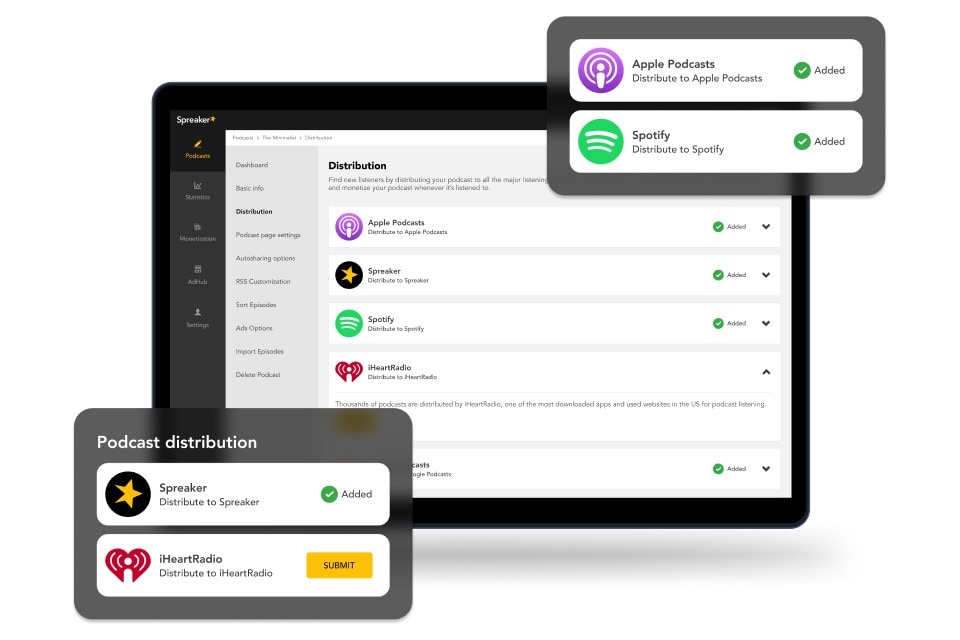
Spreaker is for individuals who want to integrate their requirements for a podcasting platform. They are searching for a phone audio recording tool in one practical subscription.
Spreaker works by just using your cellphone to record a podcast episode. Even though you might need to spend money on the necessary tools, Spreaker will allow you to create high-quality audio from your house. You can share podcast episodes to popular websites like Apple Podcasts, Google Play Store, Deezer, and others. All you have to use is Spreaker’s one-click distribution option.
Features:
- Automatically upload to Apple Podcasts, Spotify, and iHeartRadio
- Web App: Yes
- Mobile Recorder: Yes
- Monetization tool: Yes
- Collaboration: Yes
- Video Recording: Yes
- Transcription: Yes
- Editing: Yes
- Split tracks for guests: No
- High-quality audio: Yes
4. Zencastr
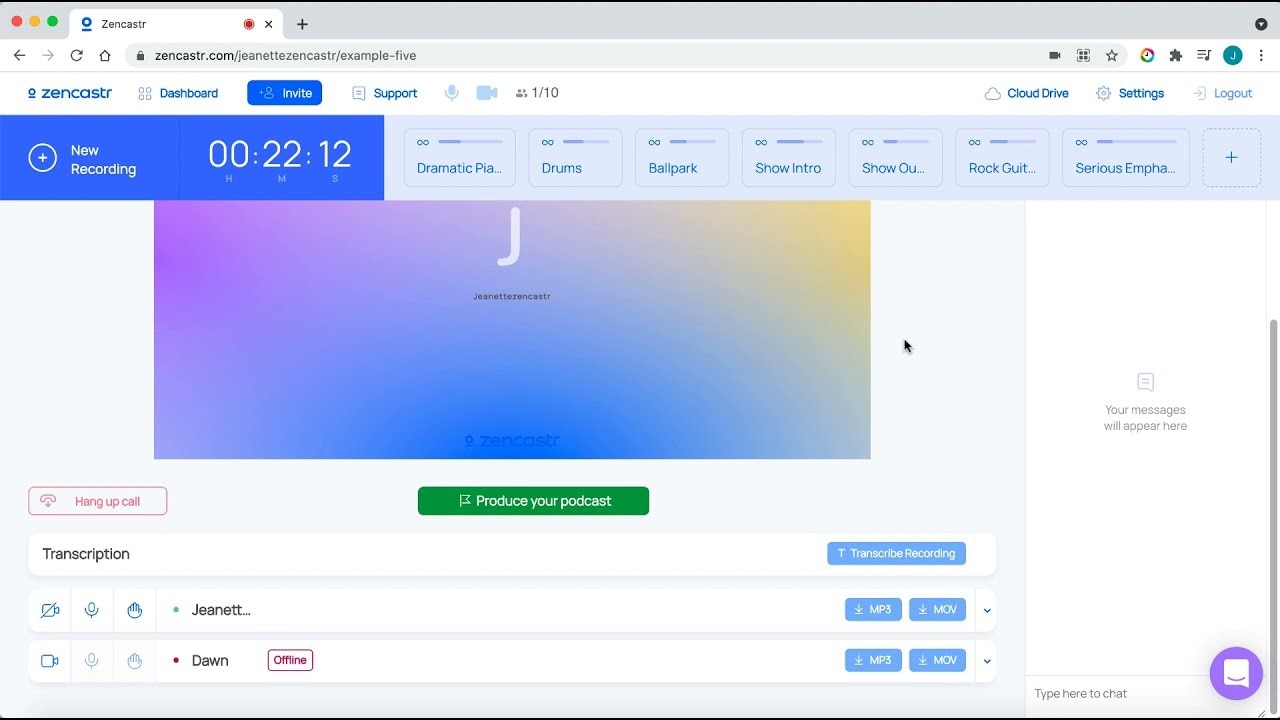
Zencastr, a web-based tool, will help you record and save studio-quality audio files directly from your browser because the program records each person’s side of the conversation individually. Before syncing them together, your audio quality is assured regardless of any potential flaws in your net connection.
The application is easy to operate and navigate and offers free and premium tiers. Most podcasters will find that the free plan has all the required capabilities. In conclusion, Zencastr is a cost-effective, user-friendly choice, so even if you’re not tech knowledgeable, this can be your program.
Features:
- Excellent recording quality in testing
- User-friendly interface
- Video Recording: Yes
- Split Tracks: Yes
- Transcription: Yes
- Editing: Yes
- Free version: Yes. Paid versions start from $20 per month.
5. Iris
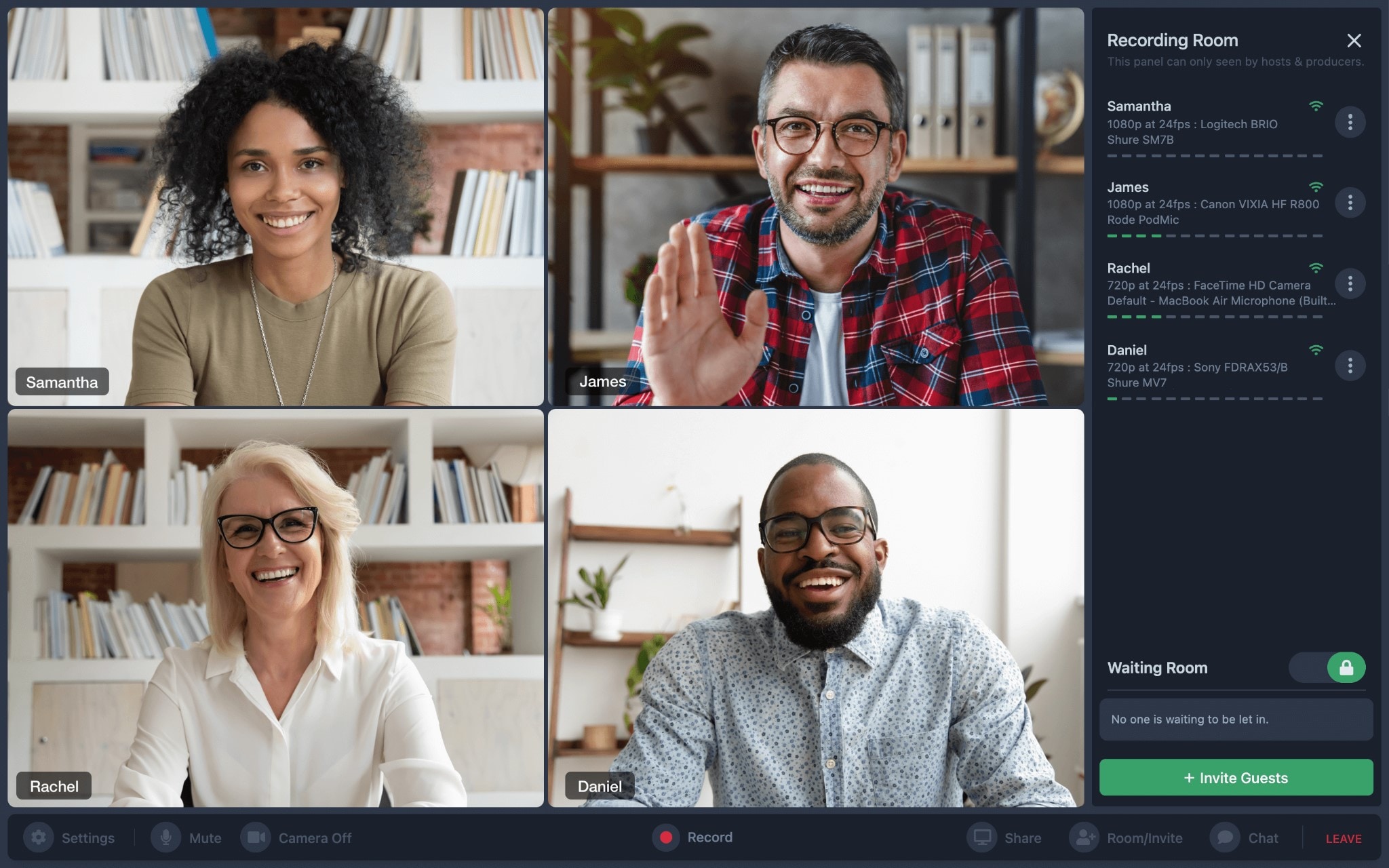
Iris is a remote recording platform that, although been on the market for just a short while, has already amassed a diverse group of customers.
It is mainly used by podcast production staff because team members can access their accounts, recordings, and timetables from any device or browser. After all, the application is web-based. It also has a superb debugging and customer assistance system.
Features:
- HD video recording: yes
- Web App: Yes
- Available Formats: MP3, MP4, and Wav
- Special guest requirements: No
- Split-track: Yes, up to nine individuals at once.
- Transcription: No
- Editing: No
- Podcasts Hosting: No
- Automatic upload to Dropbox and Google Drive
6. Riverside
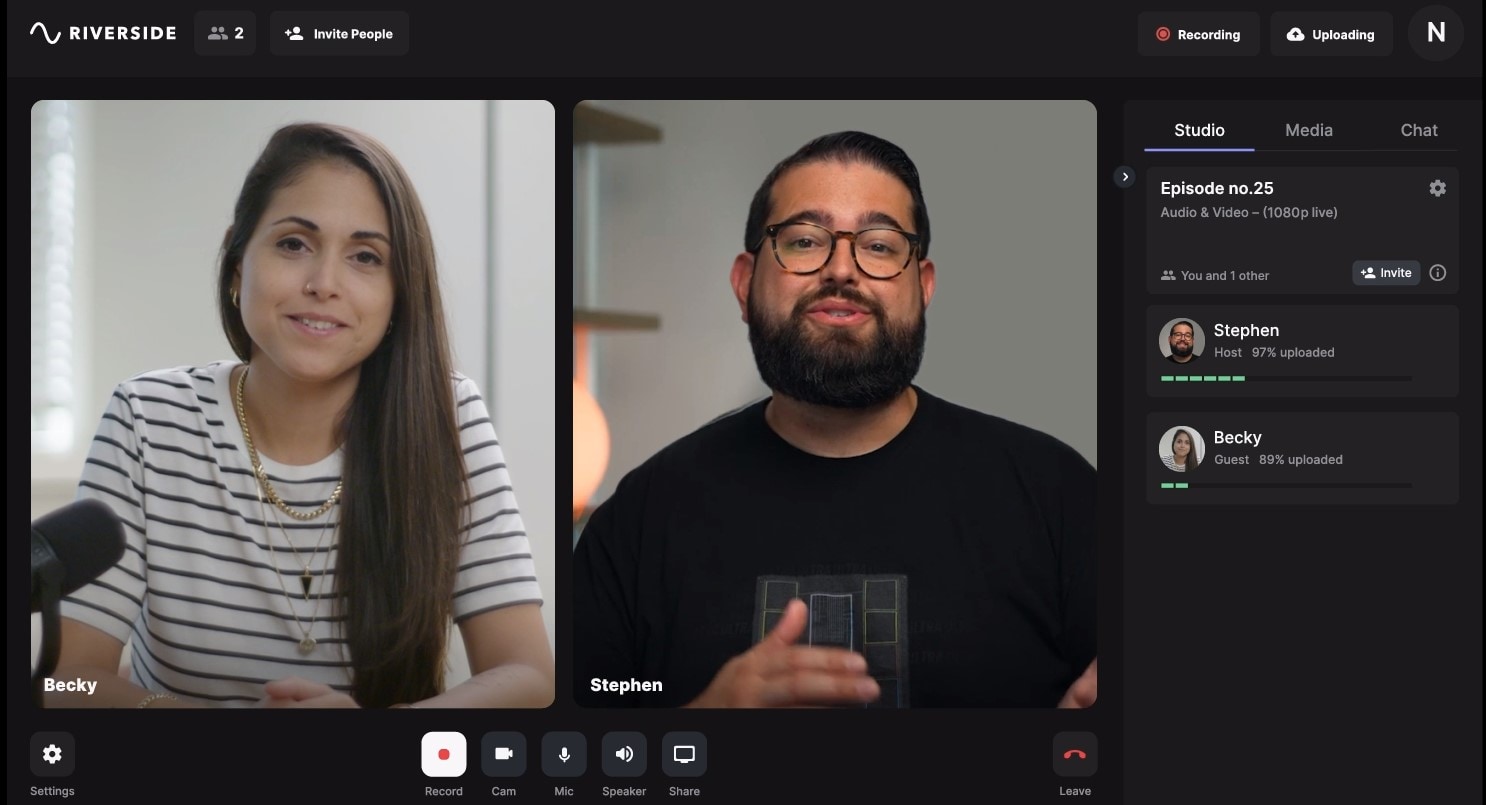
Riverside is comparatively newer than other platforms but already has many essential and remarkable features. For example, if you want live podcasting, it includes built-in integrations for Facebook, YouTube, Twitter, and Twitch live streaming.
From the dashboard in Riverside, you may talk, switch cameras, and share your screen. In addition, they’re used by well-known podcasts like Morning Brew and the NFL, so you know you’re in capable hands.
Features:
- Video Recording: Yes
- Transcription: Yes
- Podcast Hosting: No
- Call-in feature: Yes
- Available Data Formats: MP3, MP4, and WAV
- Split-track: Yes, for both audio and video
- of guests it can accommodate: one host and seven guests.
- Editing tools: Yes, Top & tail, post-processing, and video layout are available.
7. Ringr
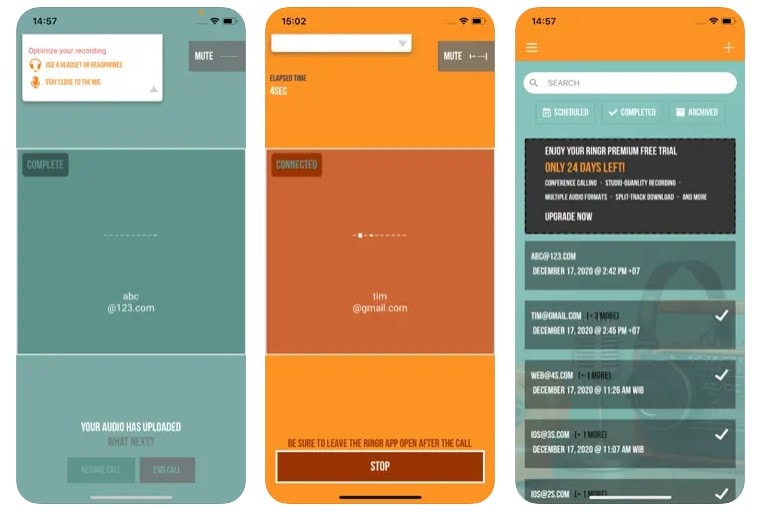
Ringr is a recording application. It is famous for its user-friendly interface and good sound quality. This software is perfect for you if you want audio recordings that have the polished quality of those made in a studio.
Features:
- Video Recording: No
- Transcription: No
- Podcast hosting: No
- Call resuming is supported
- Enterprise dashboard: Yes
- Conference calling: Yes
- File formats available: MP3, OGG and FLAC
8. Cleanfeed
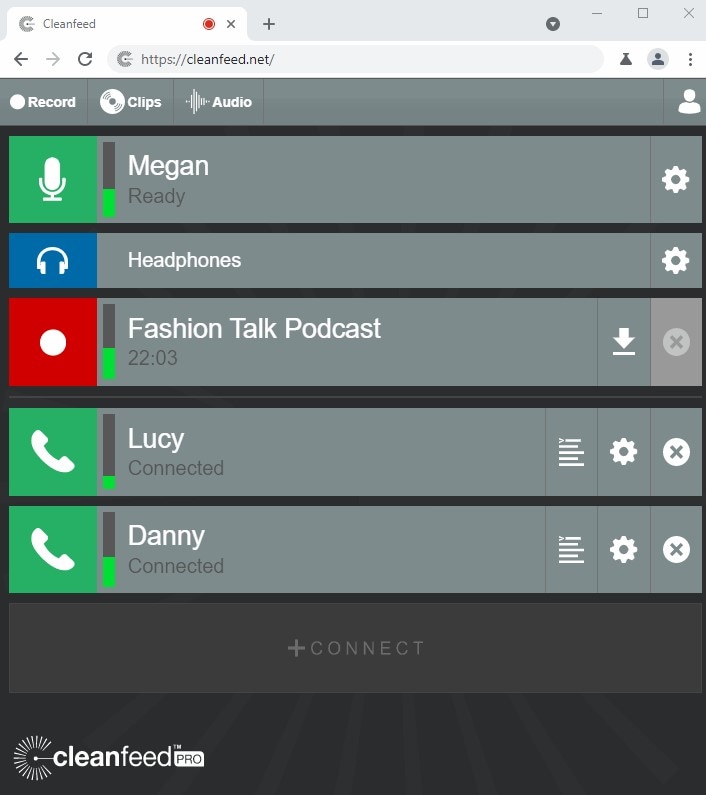
Cleanfeed is a simplified browser-based collaborative solution for live audio and recording. The user has access to several features with the “Pro” subscription. The software is adaptable and lets you connect with numerous visitors who may individually participate in the recording session. It is convenient for guests via their tablet, laptop, PC, or smartphone.
Features:
- Available for both Mac and PC
- Audio restoration: Yes
- Video Recording: No
- Transcription: No
- Podcast hosting: No
- Split track: Yes, for standard and pro tiers
- Volume control: Yes
Part 3. What Recording App Is the Best Fit for Your Podcast?
Sometimes having too many options is worse than having none at all. So let’s consider if you found all of this overwhelming.
Free Options
Cleanfeed or Riverside. FM is the best fit for you if you opt for free options.
Options For Multiple Tracks and Video
Riverside and SquadCast are the top-rated alternatives for Zoom. Both locally record audio and video, then send individual speaker files to the cloud. It prevents potential call connection problems and lets you manually tune and clean up each speaker.
All-Inclusive Package
Alito is the perfect fit for you if you’re into all-in-one solutions. You can do the audio cleanup, volume leveling, editing, adding music, finalizing your episodes, and creating transcriptions in addition to remote recording using this user-friendly interface.
Part 4. Hot FAQs About How to Record a Podcast Remotely
These are the frequently asked questions about remotely recording podcasts.
What is the ideal duration for a podcast?
Your podcast’s length will also vary depending on its topic, niche, or genre. The ideal size for your audience can be between 15 and 20 minutes. However, if your target audience wants more detailed, exploratory material, 45–90 minutes might be more beneficial.
Can you create a podcast using only your phone?
Even older smartphones have most of the features required to generate a primary podcast. We’ve listed a collection of voice recording apps, audio editors, and software made especially for podcast production.
What factors contribute to podcast success?
High-quality podcasts are more likely to succeed. Having high-quality audio can give your podcast a more professional appearance. Additionally, it will help you strengthen your entire business strategy and draw in pay-per-click advertisers. A wise long-term investment in the success of your podcast is high-quality recording equipment.
Summary
Regardless of your platform, you might still want to utilize an audio editing application to polish and perfect your interviews. A crucial ability for a podcaster is to learn remote podcast recording. By informing your guests to utilize an external mic (USB mics are acceptable) and ensuring all noises and distractions are kept to a minimum, you can help screen your guests and get them ready for the interview.
Part 1. How to Podcast Remotely
With the advanced tech, recording podcasts remotely is no longer a problem. We’ve provided some common methods you can use.
1. Using video conferencing software
If you are a beginner at podcasting, using video conferencing software is the best option, as it is both efficient and budget-friendly. Zoom, Google Meet, and Microsoft Teams are famous video conferencing software.
2. Use a mixer to record phone calls
This method is most suitable for podcasters and visitors who need a reliable internet connection. It is simple and free to use. All you need is a good mobile signal, a podcast microphone, headphones, an iPhone or Android phone, a 1/4” cable, and an XLR microphone.
Even if your visitor doesn’t have Wi-Fi or isn’t technologically aware, you can call them and record the conversation. However, it should be the last op
3. Record a double-ender
This last method is best for getting excellent sound quality on a budget. It is challenging to use but offers free services and studio quality. It would be best if you had a Podcast microphone, headphones, recording software, and computer to use this method. This equipment is required for both participants.
You get the most excellent audio quality possible because these files are local recordings. However, they are challenging to set up and ineffective for video recordings. Therefore, we’ve listed top-rated audio recording apps and software for you.
Part 2. Best Audio Recording Apps and Software to Record Remotely
Following are the details of some of the best platforms used to Record Podcast Remotely.
1. Alitu

Alitu is an all-in-one podcast creator for people who desire high-quality podcasts. This software allows you to record group calls and leaves the rest of the technical details. In addition, it uses simple “drag and drops” editing technology, making work more efficient.
Once complete, you may modify the recording in the Alitu episode builder. You can also add intros, outros, commercials, or transitional effects. After that, you can publish your podcast episode to your selected hosting service or Alito’s built-in hosting.
Alitu’s features are available for one flat rate and can be accessed through its easy-to-use, intuitive interface.
Features:
- Audio files (MP3) can be uploaded directly to your host or Alitu’s internal server.
- Video recording: No, but it can make a video of your episode by putting together a still image and a moving soundwave.
- Web App: Yes
- Split-track: No
- Transcription: Yes
- Podcast hosting: Yes
- Noise reduction: Yes
- Voice leveling: Yes
- Post-production AI: Yes
2. SquadCast

It provides a wide range of features that will aid any podcaster in improving their recording. In addition, SoundCast guarantees the protection and safety of your work.
Additionally, you can participate by video with a single host and as many as three guests. A guest can join a recording without creating an account. SquadCast’s user-friendly interface is easy for anyone. It will be easy even if they are unfamiliar with remote recording software.
Features:
- Sound and video files in MP3, MP4, and WAV formats
- Web App: Yes
- Guest requirements: No
- Split-track: Yes
- Transcription: No
- Editing: No
- Progressive upload: Yes
- Post-production recording separation: Yes
- Automatic backups: Yes
3. Spreaker

Spreaker is for individuals who want to integrate their requirements for a podcasting platform. They are searching for a phone audio recording tool in one practical subscription.
Spreaker works by just using your cellphone to record a podcast episode. Even though you might need to spend money on the necessary tools, Spreaker will allow you to create high-quality audio from your house. You can share podcast episodes to popular websites like Apple Podcasts, Google Play Store, Deezer, and others. All you have to use is Spreaker’s one-click distribution option.
Features:
- Automatically upload to Apple Podcasts, Spotify, and iHeartRadio
- Web App: Yes
- Mobile Recorder: Yes
- Monetization tool: Yes
- Collaboration: Yes
- Video Recording: Yes
- Transcription: Yes
- Editing: Yes
- Split tracks for guests: No
- High-quality audio: Yes
4. Zencastr

Zencastr, a web-based tool, will help you record and save studio-quality audio files directly from your browser because the program records each person’s side of the conversation individually. Before syncing them together, your audio quality is assured regardless of any potential flaws in your net connection.
The application is easy to operate and navigate and offers free and premium tiers. Most podcasters will find that the free plan has all the required capabilities. In conclusion, Zencastr is a cost-effective, user-friendly choice, so even if you’re not tech knowledgeable, this can be your program.
Features:
- Excellent recording quality in testing
- User-friendly interface
- Video Recording: Yes
- Split Tracks: Yes
- Transcription: Yes
- Editing: Yes
- Free version: Yes. Paid versions start from $20 per month.
5. Iris

Iris is a remote recording platform that, although been on the market for just a short while, has already amassed a diverse group of customers.
It is mainly used by podcast production staff because team members can access their accounts, recordings, and timetables from any device or browser. After all, the application is web-based. It also has a superb debugging and customer assistance system.
Features:
- HD video recording: yes
- Web App: Yes
- Available Formats: MP3, MP4, and Wav
- Special guest requirements: No
- Split-track: Yes, up to nine individuals at once.
- Transcription: No
- Editing: No
- Podcasts Hosting: No
- Automatic upload to Dropbox and Google Drive
6. Riverside

Riverside is comparatively newer than other platforms but already has many essential and remarkable features. For example, if you want live podcasting, it includes built-in integrations for Facebook, YouTube, Twitter, and Twitch live streaming.
From the dashboard in Riverside, you may talk, switch cameras, and share your screen. In addition, they’re used by well-known podcasts like Morning Brew and the NFL, so you know you’re in capable hands.
Features:
- Video Recording: Yes
- Transcription: Yes
- Podcast Hosting: No
- Call-in feature: Yes
- Available Data Formats: MP3, MP4, and WAV
- Split-track: Yes, for both audio and video
- of guests it can accommodate: one host and seven guests.
- Editing tools: Yes, Top & tail, post-processing, and video layout are available.
7. Ringr

Ringr is a recording application. It is famous for its user-friendly interface and good sound quality. This software is perfect for you if you want audio recordings that have the polished quality of those made in a studio.
Features:
- Video Recording: No
- Transcription: No
- Podcast hosting: No
- Call resuming is supported
- Enterprise dashboard: Yes
- Conference calling: Yes
- File formats available: MP3, OGG and FLAC
8. Cleanfeed

Cleanfeed is a simplified browser-based collaborative solution for live audio and recording. The user has access to several features with the “Pro” subscription. The software is adaptable and lets you connect with numerous visitors who may individually participate in the recording session. It is convenient for guests via their tablet, laptop, PC, or smartphone.
Features:
- Available for both Mac and PC
- Audio restoration: Yes
- Video Recording: No
- Transcription: No
- Podcast hosting: No
- Split track: Yes, for standard and pro tiers
- Volume control: Yes
Part 3. What Recording App Is the Best Fit for Your Podcast?
Sometimes having too many options is worse than having none at all. So let’s consider if you found all of this overwhelming.
Free Options
Cleanfeed or Riverside. FM is the best fit for you if you opt for free options.
Options For Multiple Tracks and Video
Riverside and SquadCast are the top-rated alternatives for Zoom. Both locally record audio and video, then send individual speaker files to the cloud. It prevents potential call connection problems and lets you manually tune and clean up each speaker.
All-Inclusive Package
Alito is the perfect fit for you if you’re into all-in-one solutions. You can do the audio cleanup, volume leveling, editing, adding music, finalizing your episodes, and creating transcriptions in addition to remote recording using this user-friendly interface.
Part 4. Hot FAQs About How to Record a Podcast Remotely
These are the frequently asked questions about remotely recording podcasts.
What is the ideal duration for a podcast?
Your podcast’s length will also vary depending on its topic, niche, or genre. The ideal size for your audience can be between 15 and 20 minutes. However, if your target audience wants more detailed, exploratory material, 45–90 minutes might be more beneficial.
Can you create a podcast using only your phone?
Even older smartphones have most of the features required to generate a primary podcast. We’ve listed a collection of voice recording apps, audio editors, and software made especially for podcast production.
What factors contribute to podcast success?
High-quality podcasts are more likely to succeed. Having high-quality audio can give your podcast a more professional appearance. Additionally, it will help you strengthen your entire business strategy and draw in pay-per-click advertisers. A wise long-term investment in the success of your podcast is high-quality recording equipment.
Summary
Regardless of your platform, you might still want to utilize an audio editing application to polish and perfect your interviews. A crucial ability for a podcaster is to learn remote podcast recording. By informing your guests to utilize an external mic (USB mics are acceptable) and ensuring all noises and distractions are kept to a minimum, you can help screen your guests and get them ready for the interview.
Also read:
- [New] In 2024, Perfect Game Capture in Minecraft
- [New] In 2024, Streamline Game Saves Mastering FBX Recording
- [New] Securing Group Discussions on Hangouts for 2024
- [Updated] 2024 Approved Pure Pitch Perception Recording in Mac Studios
- [Updated] 2024 Approved Webcam & Monitor Recording How to Combine
- [Updated] In 2024, How to Record Minecraft on Mac
- [Updated] YouTube's Celebrated Click-It Achievements
- 2024 Approved Clandestine Call Collectors Discreet Voice Capture Tools List
- 2024 Approved Instant Annotation Text Overlaying on Images & Videos Using Windows Photos
- 2024 Approved Visualize Your Browser Trails Our Selection of Premier Recording Apps
- Comprehensive Tutorial on Safely Installing a New SSD in Your Razer Blade 15 (202N)
- How To Change Your Apple iPhone X Apple ID on MacBook
- In 2024, Journey Into Tech Mastery Essential Tips for Screen Recording Your Mac
- Safeguarding Conversations: How Neural Network Inversion Threats Impact Chatbot Privacy
- Talk Titans Clash: Understanding Distinct Chatbot Traits
- Tutorial to Change Nubia Z50 Ultra IMEI without Root A Comprehensive Guide
- Unveiling the Apple Watch Ultra Series 2: What's New in Features, Price Forecasts, and Release Timeline?
- Title: [New] 2024 Approved DIY Remote Podcast Production Tips
- Author: Mary Shelley
- Created at : 2024-12-16 03:26:33
- Updated at : 2024-12-23 08:32:35
- Link: https://screen-sharing-recording.techidaily.com/new-2024-approved-diy-remote-podcast-production-tips/
- License: This work is licensed under CC BY-NC-SA 4.0.